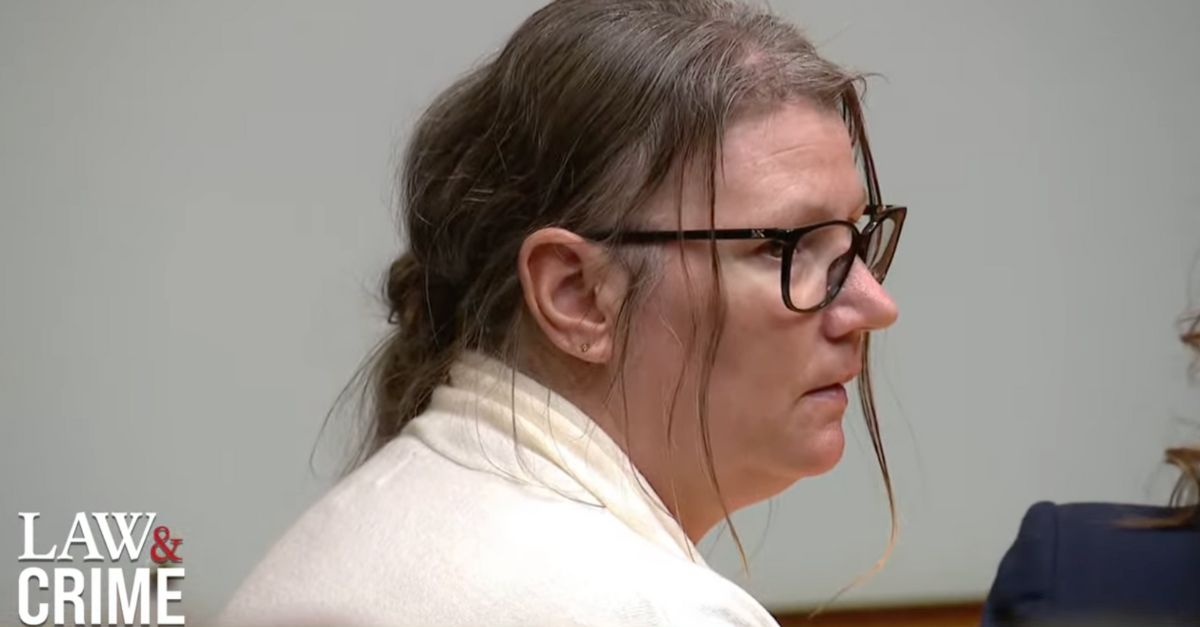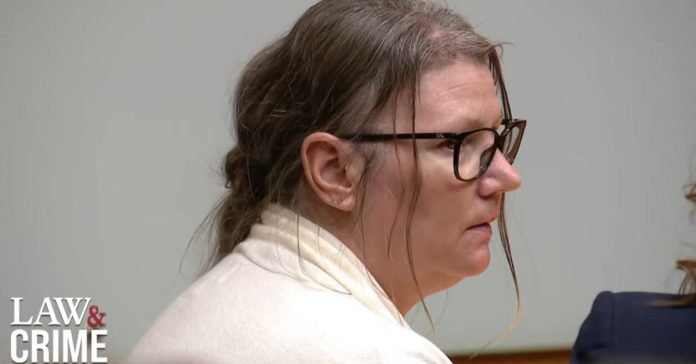
Jennifer Crumbley is seen awaiting the verdict on manslaughter charges in connection with her son Ethan Crumbley’s deadly 2021 attack at Oxford High School (via Law&Crime).
The mother of the Michigan teenager who gunned down four of his classmates in a 2021 mass shooting has been convicted of manslaughter.
Jennifer Crumbley, 45, was convicted by a jury on Tuesday, after nearly 11 hours of deliberation and a 10-day trial.
As Law&Crime has previously reported, Jennifer Crumbley was charged with manslaughter in the deaths of Tate Myre, 16, Hana St. Juliana, 14, Madisyn Baldwin, 17, and Justin Shilling, 17, who were killed when her son, Ethan Crumbley, then 15, opened fire on his classmates on Nov. 30, 2021. According to prosecutors, Jennifer Crumbley was the last person in possession of the weapon her son used to carry out the attack — a handgun she had described on social media as her son’s Christmas present days prior. They also alleged that she didn’t take reasonable steps to stop the rampage and find care for her son.
According to prosecutors, James and Jennifer Crumbley knew their son was troubled — and had been called to the school the day of the shooting after teachers discovered disturbing and violent drawings he had made in a math workbook. The parents ultimately left the school after meeting with school officials and their son, while Ethan Crumbley stayed behind.
Arrest warrants were issued for Jennifer Crumbley and James Crumbley, her husband and Ethan Crumbley’s father, who is also charged with manslaughter, after the shooting. They appeared to have attempted to evade apprehension by the police but were eventually found hiding in a building near downtown Detroit, around 30 minutes away from Oakland.
In closing arguments on Friday, prosecutors told jurors that it would not have taken much for Jennifer Crumbley to stop her son from carrying out the shooting.
“Ordinary care [means] what [is] the tragically smallest thing she could have done to prevent this?” Oakland County prosecutor Karen McDonald asked the jury before offering several examples.
“[T]he tragic part about it is none of it was hard,” McDonald later said. “None of it. The smallest thing, just the smallest thing could have saved Hana, Tate, Justin, and Madisyn. The smallest of things.”
Jennifer Crumbley’s defense lawyer, Shannon Smith, said her client had no reason to believe her son would have done what he did and drew on her own experience as a parent to present Jennifer Crumbley as a relatable mom.
Calling the case “a very dangerous case for parents out there,” Smith said that her client’s texts about her son — including telling a friend he was an “oopsie baby” and “weird” — are nothing out of the ordinary. She cited her own texts to her husband describing their daughter as a “psycho” and a “nut case” and said that without context, it appears that she doesn’t care about her children’s mental health.
Smith referred to her client as a “hypervigilant” parent, citing Jennifer Crumbley’s treatment of her son’s medical issues, including headaches, cavities, and even an abnormal mole on his back.
“She pays more attention to those kinds of things than I do,” she said, motioning to her client sitting at the defense table. “I could very easily be sitting in that chair.”
Legal experts were surprised by Smith’s approach during closing arguments.
“The purpose of a closing is to summarize the evidence and argue why the prosecution proved the case beyond a reasonable doubt, or why the prosecution failed to prove the case beyond a reasonable doubt,” said Terri Austin, host and legal analyst for Law&Crime. “Personal opinions and reference to personal experiences are generally not allowed. The prosecution should have objected when defense counsel continuously and repeatedly referred to her personal experiences.”
Austin said that closing arguments like Smith’s create a potential for jury nullification, which occurs when a jury disregards the law and evidence and bases the verdict on their own sense of justice, Smith said.
Manslaughter is a felony under Michigan law, punishable by up to 15 years in prison. Sentencing was set for April 9.
Ethan Crumbley, now 17, pleaded guilty in October to all 24 charges against him, including murder and terrorism. He was sentenced to a lifetime in prison without the possibility of parole.
The trial of James Crumbley, Jennifer Crumbley’s husband and the teen’s father, is set to begin March 5.
Have a tip we should know? [email protected]

